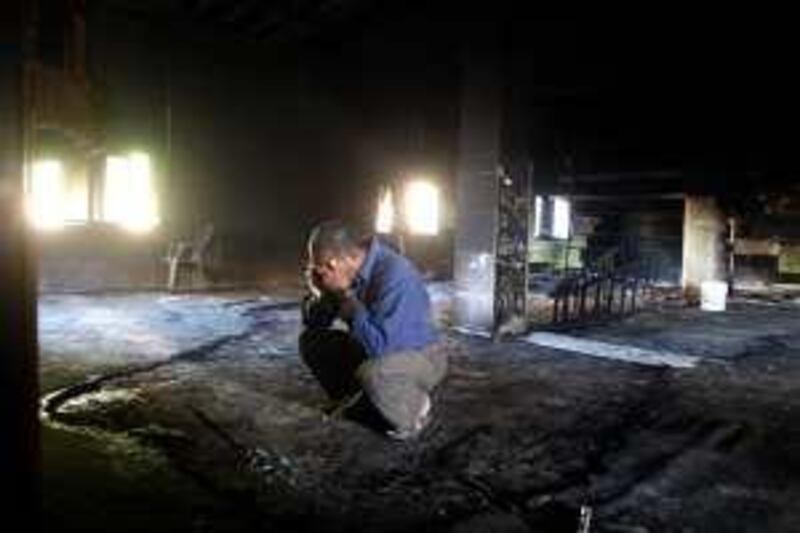RAMALLAH // Palestinians accused Jewish settlers of setting fire to a mosque in the village of Al Liban al Sharqiya yesterday with Mahmoud Abbas, the PLO chairman, labelling the incident an attempt to undermine efforts to restart peace negotiations. An Israeli police investigation was under way to determine the cause of the fire, which gutted the mosque. The result is expected today, but a police spokesman, Micky Rosenfeld, earlier refused to rule out an electrical fault, something Palestinian sources dismissed.
"There were Qurans piled into a heap and burnt and plastic flip-flops scattered about to sustain and spread the fire," said Ghassan Dughlas, a Palestinian official responsible for settlement issues in the northern West Bank who inspected the site. Villagers said two cars with Israeli number plates had entered the village early yesterday morning at around 3am and parked near the mosque. One villager said he had seen some 20 settlers gather flammable materials such as curtains or books and set the fire.
Al Liban al Sharqiya lies close to three small settlements, Eli, Shilo and Ma'ale Levona, the inhabitants of which cause the village regular problems, according to Jamal Daragma, the village council chief, who said 30 per cent of village land had been expropriated to make way for the Jewish colonies. The settlements are home to ultranationalist Jewish settlers opposed to any kind of territorial concessions to the Palestinians in peace negotiations.
With George Mitchell, the US Middle East envoy, arriving back in the region yesterday and expected to launch indirect negotiations between the Palestinians and Israel today, the timing of the fire did not escape notice. In a statement issued by his office, Mr Abbas said the "criminal attack threatens efforts to revive the peace process", while Mr Dughlas suggested the two were causally linked. "The fire is a message to the Arab world and other countries that talks will not succeed. These are people [settlers] who oppose any kind of settlement construction freeze, and they know that there will be no talks if there is a settlement construction freeze," said Mr Dughlas.
Benjamin Ben-Eliezer, the Israeli minister for industry and trade, also said he believed settlers had set the fire as an act of provocation. "I have no shadow of doubt their aim was to ignite a fire in the region and this is lamentable," he told Israeli army radio. Recent months have seen settler groups in the occupied West Bank step up a campaign of violence and vandalism against Palestinians and their properties and lands in what the Israeli media has dubbed a "price tag" effort.
Yesterday's incident is the third time since December that a mosque has burnt to the ground in settler-related incidents. Settlers say their main aim is to dissuade the Israeli government from taking any steps against settlements, whether in the form of a settlement construction freeze or commitments to remove some settlements in negotiations with the Palestinians. Thus the announcement by the Israeli government last year of a settlement construction freeze in the West Bank excluding East Jerusalem, was met with a wave of violence and protest, even though the "freeze" is better described as a construction slowdown that settlement watch groups like Yesh Din have said has not since been effectively enforced.
Reports that a tacit agreement has been struck to similarly curtail building in settlements in East Jerusalem in order to clear the way for the so-called proximity talks may have provoked settlers back into action, said Mr Dughlas. He pointed out that the District Co-ordinating Office, the body responsible for liaising between the Palestinian and Israeli security forces, had on Monday sent warnings to villages in the area, including al Liban al Sharqiya, to expect settler disturbances.
Palestinians have long called on the Israeli authorities to hold settler groups accountable for their actions, but remain sceptical that any action will be taken. Indeed, Mr Abbas said yesterday that the Israeli government had to be held ultimately responsible for acts of settler violence, "because the Israeli army protects the settlers". A study by Yesh Din published in January found that of nearly 1,800 criminal investigations opened by the Israeli police against settlers in eight years up until the end of 2009, only 105, or just under six per cent, led to indictments. Such figures prove, say activists and Palestinians, that the law is not being properly enforced.
Jewish settlers living in the West Bank, furthermore, are held accountable to Israeli civil law, with its presumption of innocence, unlike Palestinians in the West Bank, who, if arrested, face military courts and the use of secret evidence. @Email:okarmi@thenational.ae





